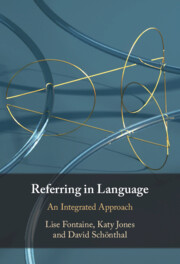Book contents
- Referring in Language
- Referring in Language
- Copyright page
- Contents
- Figures
- Tables
- Acknowledgements
- Part I The Nature of Referring and Referring Expressions
- 1 The Multidisciplinary Field of Referring
- 2 The Great Debate
- 3 A Functional Grammar for Referring Expressions
- Part II Typical Reference
- Part III Atypical Reference
- References
- Index
2 - The Great Debate
Definiteness and Indefiniteness
from Part I - The Nature of Referring and Referring Expressions
Published online by Cambridge University Press: 22 June 2023
- Referring in Language
- Referring in Language
- Copyright page
- Contents
- Figures
- Tables
- Acknowledgements
- Part I The Nature of Referring and Referring Expressions
- 1 The Multidisciplinary Field of Referring
- 2 The Great Debate
- 3 A Functional Grammar for Referring Expressions
- Part II Typical Reference
- Part III Atypical Reference
- References
- Index
Summary
This chapter unpacks the complex stitching that makes up the reference tapestry by reviewing theories of indefiniteness and definiteness and by examining the complex issues of in-/definiteness. The chapter argues that definiteness is a speaker-centred concept, including whether the speaker expects the addressee able to share a sufficiently similar conceptualisation of the referent and that the entire discourse event contributes to the establishment of an entity as definite or not. For this reason, we argue for the separation of reference (function) from the expression (form). An indefinite expression (form) can be used for definite reference (function) and a definite expression (form) can be used for indefinite reference (function). There is no one-to-one relationship between the lexicogrammatical realisation of the expression and its function in an act of reference. The chapter includes discussion of various types of referential choice including lexical expressions, pronouns, and proper names.
Information
- Type
- Chapter
- Information
- Referring in LanguageAn Integrated Approach, pp. 23 - 47Publisher: Cambridge University PressPrint publication year: 2023
